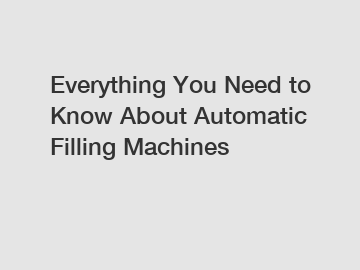Everything You Need to Know About Automatic Filling Machines
Everything You Need to Know About Automatic Filling Machines.
Automatic filling machines are a crucial component in various industries, including food and beverage, pharmaceuticals, cosmetics, and household products. These machines are designed to accurately fill containers with liquid or solid products at a high speed, thereby improving efficiency and reducing labor costs. In this article, we will delve into the key aspects of automatic filling machines, including how they work, their benefits, and their impact on the production process.
How Do Automatic Filling Machines Work?

Automatic filling machines operate by utilizing advanced technology to fill containers with precise amounts of product. The process typically involves the following steps:
1. Product Feeding: The product is fed into the machine through a hopper or conveyor belt.
2. Container Placement: Empty containers are positioned on the machine's conveyor belt or rotary table.
3. Filling: The product is dispensed into the containers through a filling nozzle or pump.
4. Capping or Sealing: Once filled, the containers are sealed with caps, lids, or labels.
5. Inspection: The filled containers are inspected for quality control before being packaged and shipped.
The precision and speed of automatic filling machines make them ideal for high-volume production environments where consistency and efficiency are paramount.
Benefits of Automatic Filling Machines.
The advantages of automatic filling machines are numerous. Some of the key benefits include:
1. Increased Efficiency: Automatic filling machines can fill containers at a much faster rate than manual labor, reducing production time and labor costs.
2. Accurate Filling: These machines are programmed to dispense precise amounts of product, eliminating human error and ensuring uniformity.
3. Versatility: Automatic filling machines can accommodate a wide range of container sizes and product viscosities, making them suitable for diverse production needs.
4. Improved Hygiene: By automating the filling process, the risk of contamination is minimized, ensuring product safety and quality.
5. Cost-Effectiveness: While the initial investment in automatic filling machines can be substantial, the long-term cost savings and increased productivity justify the expense.
Impact on the Production Process.
The integration of automatic filling machines into the production process has a significant impact on overall efficiency and profitability. By streamlining the filling process, companies can increase output, reduce waste, and improve product quality. Additionally, the ability to adjust filling parameters easily allows for greater flexibility in meeting changing production demands.
In conclusion, automatic filling machines are an essential tool for modern manufacturing processes, offering a range of benefits that ultimately lead to improved productivity and profitability. By understanding how these machines work and the advantages they provide, businesses can make informed decisions about integrating them into their operations.
If you are looking for more details, kindly visit China electromagnetic roasting machine, electromagnetic roasting machine supplier, automatic screw press machine manufacturer.

Comments
0